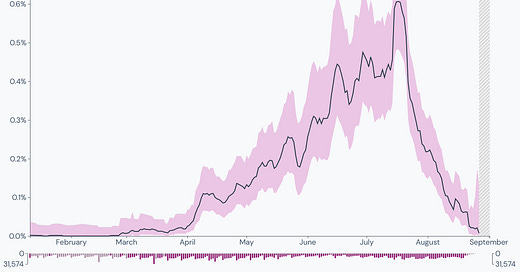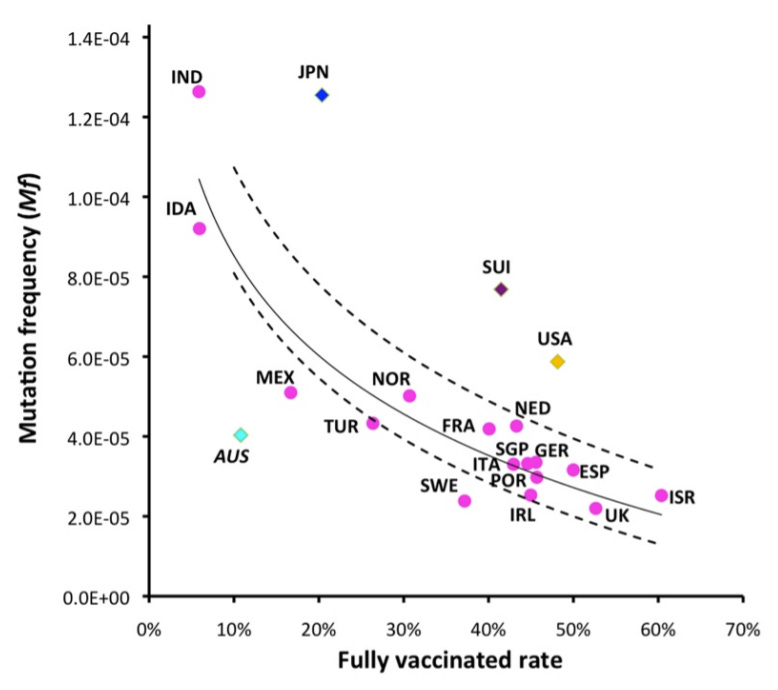On August 31, a new Variant of Interest (which is a classification less severe than a “Variant of Concern”) was added to the World Health Organization’s weekly report: Mu. This has made a splash in the news. So, what is Mu and should we be worried?
What is Mu?
Mu has the scientific name of B.1.621 and was first discovered in Colombia in January 2021. It has since spread to 39 countries, including the United States. Mu’s name is so new that it’s not been updated on the CDC variant tracker yet. But on August 28, Mu accounted for ~0.2% of our cases in the States.
There are 17 mutations on Mu with 6 mutations on the spike protein. There is considerable interest in this variant because, as the WHO stated, it has a “constellation of mutations that indicate potential properties of immune escape”. In other words, there are number of changes on the virus in which our treatments and vaccines may not recognize, and, thus not work.
Some of these mutations we know about (because they are on other variants), some of Mu’s mutations are new. In particular, Mu has the following noteworthy changes:
D614G: This mutation is very common. It started to appear in Feb 2020 and is now on every variant thereafter. This mutation increases transmissibility of the virus.
P681H: This is a mutation that is found on the Alpha variant (first discovered in the UK), which increases transmissibility.
T95I: This is where our monoclonal antibodies and antiviral treatments attach, so this change could mean escape from medical interventions and immunity. We see this mutation on Iota, too.
E484K and N501Y: These two mutations are on the receptor binding domain, which is the virus’ key to our cells (ACE2 receptors; read more on my previous post here). E484K is resistant to monoclonal antibodies and immunity. N501Y is responsible for increased transmission. Both are present on other variants including Alpha, Beta, Gamma, Eta, and Iota.
Q160R: This mutation suppresses the immune response allowing the virus additional opportunity to replicate.
S67F: This change is unique to Mu. Scientists are worried about this change because it’s on a location that inhibits B- and T-cell recognition (i.e. immune response). Researchers are quickly studying this change. It could be concerning but it also could be nothing.
Should we be worried?
Probably not, but it’s worth watching. There are three broad ways in which a virus will mutate:
More transmissible
More deadly
Escape vaccine immunity
It looks like Mu is mostly #2 (as seen in nursing home deaths in Belgium) and #3. So it’s more deadly and could escape vaccines and medical treatments. Importantly, though, it doesn’t look to be more transmissible than Delta. Because of this, Delta is holding strong and isn’t being pushed away. In fact, the global prevalence of Mu is decreasing, which is a great sign.
If Mu can’t compete with Delta, it will remain in pockets and won’t have dominant global spread. The WHO made it very clear that it’s closely watching how Mu competes with Delta in Colombia and Ecuador.
A new mutation shouldn’t be a surprise
SARS-CoV-2 is mutating every two weeks due to the high levels of transmission across the globe. Only 36% of the globe is vaccinated with low adherence to public health measures in some countries, which allows this virus to jump from person-to-person at a high rate.
Contrary to misinformation circulating on the web, vaccines do not promote mutations. We actually saw the opposite in a recent study. Scientists looked at the rate in which Delta made small changes as it spread throughout 20 countries between June 20 to July 3 2021. They found that vaccination coverage was inversely related to the mutation frequency. In other words, the more a country was vaccinated, the less fast the virus changed. There were four countries that didn’t follow this pattern:
Australia: Where the country isn’t very vaccinated (10.8%) but mutation frequency was also extremely low. This is likely due to their strict lockdowns.
Japan, USA, and Switzerland: The rate of mutation was very high relative to vaccination rates, suggesting that mitigation strategies have been less successful
Global vaccination is incredibly important. What happens in India (like Delta), Peru (like Lambda), Colombia (like Mu), the UK (like Alpha), the United States (like Iota), etc. has direct implications for the rest of the world. This is truly a global pandemic. We need to get as many people vaccinated as quickly as possible AND follow public health mitigation measures so transmission, and thus mutations, slow down.
Love, YLE










Should we be worried? In a sane world, no. But we live in a country that makes death threats to you and Prof Smith for simply sharing data and information, a population that refuses vaccines and overwhelms our healthcare system, and would rather take a horse dewormer than actual science that works. So, yeah, I'm worried.